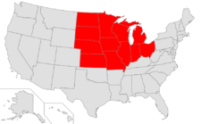 Last month provided additional confirmation that state legislatures are increasingly looking to newspaper websites rather than government sites to supplement and perhaps eventually serve as an alternative to printed newspapers as the primary medium for public notice. Bills illustrating that trend moved closer to becoming law in both Indiana and Iowa.
Last month provided additional confirmation that state legislatures are increasingly looking to newspaper websites rather than government sites to supplement and perhaps eventually serve as an alternative to printed newspapers as the primary medium for public notice. Bills illustrating that trend moved closer to becoming law in both Indiana and Iowa.
Indiana
The tenor of public notice legislation has shifted in Indiana. At the start of 2023 it was one of the two or three states that seemed most likely to abandon newspapers in favor of government websites. Yesterday the legislature approved a bill that could instead serve as a gateway to an eventual migration to newspaper websites.
News websites supplanting government sites as alternative source of notice?
 Public notice legislation introduced so far in 2024 suggests state legislatures are growing increasingly comfortable having news websites serve as an alternative source of official notice. And that comfort seems to have cooled their ardor for moving notices from newspapers to government websites.
Public notice legislation introduced so far in 2024 suggests state legislatures are growing increasingly comfortable having news websites serve as an alternative source of official notice. And that comfort seems to have cooled their ardor for moving notices from newspapers to government websites.
As of the end of last week, new legislation authorizing local news websites or newspaper websites to provide statutory notice in lieu of print had been introduced in at least six states, while bills sanctioning the move from print newspapers to government websites had been introduced in only two states — and one of them is already dead.
Newspapers battle in 2 states over right to publish notices
 Most states require newspapers to have paying subscribers to publish notices but at least a few grant that authority to free-distribution papers as well. Those requirements don’t change very often which is why it’s so unusual to have two states considering legislation this year that would allow free papers to publish notices.
Most states require newspapers to have paying subscribers to publish notices but at least a few grant that authority to free-distribution papers as well. Those requirements don’t change very often which is why it’s so unusual to have two states considering legislation this year that would allow free papers to publish notices.
The newspapers supporting the measures in both states were founded by entrepreneurs in communities where the paid-circulation newspapers have experienced multiple rounds of layoffs and cutbacks in recent years. Taking the other side of the debate are the states’ press associations, both of which oppose the bills.
Expanding public notice eligibility requirements
 The newspaper industry that existed when public notice laws were originally enacted is a thing of the past. There are fewer newspapers and they have less circulation. The papers are physically smaller and sometimes they’re designed, edited and/or printed at great geographical distances from the local markets in which they circulate. They’re also published electronically with a reach and immediacy that were unprecedented in the pre-internet era.
The newspaper industry that existed when public notice laws were originally enacted is a thing of the past. There are fewer newspapers and they have less circulation. The papers are physically smaller and sometimes they’re designed, edited and/or printed at great geographical distances from the local markets in which they circulate. They’re also published electronically with a reach and immediacy that were unprecedented in the pre-internet era.
These changes have made it increasingly difficult for newspapers and government agencies to discharge their responsibilities under public notice laws enacted many decades ago. As a result, state press associations otherwise reluctant to meddle with public notice statutes now may find it necessary to advocate for changes to ensure the laws that determine which papers qualify to publish notices remain relevant.
How not to defend public notice
 Custer County isn’t the only jurisdiction in Colorado where controversy has erupted over the publication of local notices. Greenwood Village and Pitkin County have had their own recent dust-ups over the designation of their local papers of record. The Pitkin County story is particularly instructive for the wrong reasons.
Custer County isn’t the only jurisdiction in Colorado where controversy has erupted over the publication of local notices. Greenwood Village and Pitkin County have had their own recent dust-ups over the designation of their local papers of record. The Pitkin County story is particularly instructive for the wrong reasons.
In late July, Pitkin’s Board of County Commissioners (BOCC) adopted the Aspen Daily News as its new official newspaper, displacing the Aspen Times, a daily that had served as the ski town’s paper of record since 1993. The Times had changed ownership at the beginning of the year, igniting several local controversies that apparently motivated the commissioners to make the change.
Colorado paper files slam-dunk lawsuit over lost notices
 The Wet Mountain Tribune filed a federal lawsuit last month accusing the local Board of County Commissioners (BOCC) of punishing it by awarding Custer County’s public notice contract to another newspaper. The lawsuit alleges the BOCC violated the Tribune’s First Amendment rights by retaliating against it for reporting factual matters the Board would have preferred to keep hidden.
The Wet Mountain Tribune filed a federal lawsuit last month accusing the local Board of County Commissioners (BOCC) of punishing it by awarding Custer County’s public notice contract to another newspaper. The lawsuit alleges the BOCC violated the Tribune’s First Amendment rights by retaliating against it for reporting factual matters the Board would have preferred to keep hidden.
The paper appears to have a very strong case.
A weird but benign session in Missouri
 “I’ve been doing advocacy work in the state legislature for 40 years and this was probably the weirdest session I’ve ever experienced,” says Doug Crews, lobbyist and former executive director of the Missouri Press Association (MPA), where he worked for 36 years.
“I’ve been doing advocacy work in the state legislature for 40 years and this was probably the weirdest session I’ve ever experienced,” says Doug Crews, lobbyist and former executive director of the Missouri Press Association (MPA), where he worked for 36 years.
Two related factors made the 2022 session in Jefferson City unusual, according to Crews, who now contracts with Lathrop GPM Consulting, the firm that represents MPA. About half the session was dominated by Senate debate over a redistricting map for Missouri’s eight U.S. Congressional districts. And with the Senate Republican majority split into two caucuses — one ultra-conservative and the other more moderate — functionally speaking there are now three ideologically distinct parties in the state Senate.
Two more states pass web-posting bills
Two more midwestern states passed laws last month requiring newspapers to post notices on their press association’s statewide public notice website. With Minnesota and Michigan joining South Dakota and Nebraska, four states in the region have now passed web-posting laws this year.
In total, eighteen states now have web-posting statutes on the books.
The new law in Minnesota requires newspapers to publish their notices on the Minnesota Newspaper Association’s statewide public notice website and to include an index link to the public notice section on their own websites. (Current law in Minnesota already requires newspapers to post notices on their website; the new law adds the index-link requirement and forbids the notices from being posted behind a paywall.)
Midwest press groups seek to modernize public notice laws
 (This article was corrected on April 28, 2022. See below for corrections.)
(This article was corrected on April 28, 2022. See below for corrections.)
Press associations in four midwestern states are supporting bills that would update their states’ public notice laws.
Legislatures in Minnesota and Nebraska are considering bills that would require newspapers to post all notices on their press association’s statewide public notice website. Also in Minnesota, and in Missouri, lawmakers may respond to an evolving local media environment by relaxing standards newspapers must meet to qualify to publish notices. And in South Dakota, the legislature has already passed a bill with primary elements identical to the legislation being considered in Minnesota.
New Florida public notice law first to authorize internet-only notices
 Last Thursday evening, the Florida legislature passed the most significant piece of public notice legislation in modern history.
Last Thursday evening, the Florida legislature passed the most significant piece of public notice legislation in modern history.
Sen. Ray Rodrigues’ (R-Fort Myers) SB402 makes Florida the first state in the country to significantly dilute the statutory requirement that notices must be published in print newspapers. But there’s a lot for the newspaper industry and residents of the state to like about the bill.
It’s certainly an improvement over the alternative, Rep. Randy Fine’s (R-Palm Bay) HB35, which would have moved public notice in the state from newspapers to government websites. Fine’s bill had passed the House by the time SB402 started picking up steam in the Senate.

